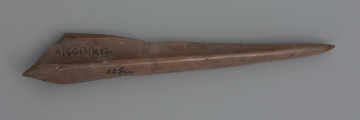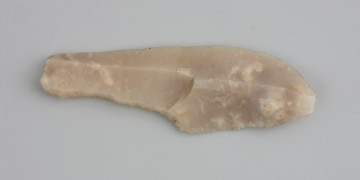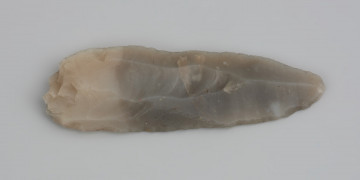
Perforator
9600 p.n.e. — 4100 p.n.e.
National Museum in Szczecin
Part of the collection: Stone Age
The blade made of deer metatarsal bone was discovered in Niezabyszewo, the Bytów district. It is one of the few examples of art from the Mesolithic or Proto-Neolithic period in Pomerania (approx. 9600-4100 BC). The blade is covered with an ornament consisting of two series of incisions, partly overlapping and forming a lattice. Such ornamentation is characteristic of hunter-gatherer communities. Its function remains unknown. It may be simple decoration, but a deeper symbolic meaning connected with beliefs or magic cannot be excluded. It is worth noting that the ornament is obliterated at the blade, which suggests that it was in use for a long time. The blade from Niezabyszewo has a relatively well-documented history. In the National Museum (Museum Narodowe) archive in Szczecin, there is a handwritten note from the former Gesellschaft für Pommersche Geschichte und Altertumskunde, dated 19 July 1895. It states: “Superintendent Neumann has given us a beautiful and rare spearhead made of bone, which was given to him by a teacher as a gift for our museum and was found on Skibbe's farm in a marl pit”. It is clear from the note that the blade was found in a layer of marl. However, there is no information as to whether it was an individual find or perhaps part of a larger assemblage.
Michał Adamczyk
Author / creator
Dimensions
cały obiekt: height: 21.3 cm, width: 3 cm
Object type
mobiliary art, blade
Technique
cutting, printing, smoothing, planing, scraping
Material
red deer bone
Origin / acquisition method
legal transfer
Creation time / dating
Creation / finding place
Owner
National Museum in Szczecin
Identification number
Location / status

9600 p.n.e. — 4100 p.n.e.
National Museum in Szczecin

11900 p.n.e. — 11000 p.n.e.
National Museum in Szczecin

11900 p.n.e. — 11000 p.n.e.
National Museum in Szczecin
DISCOVER this TOPIC
Museum of King Jan III's Palace at Wilanów
DISCOVER this PATH
Educational path